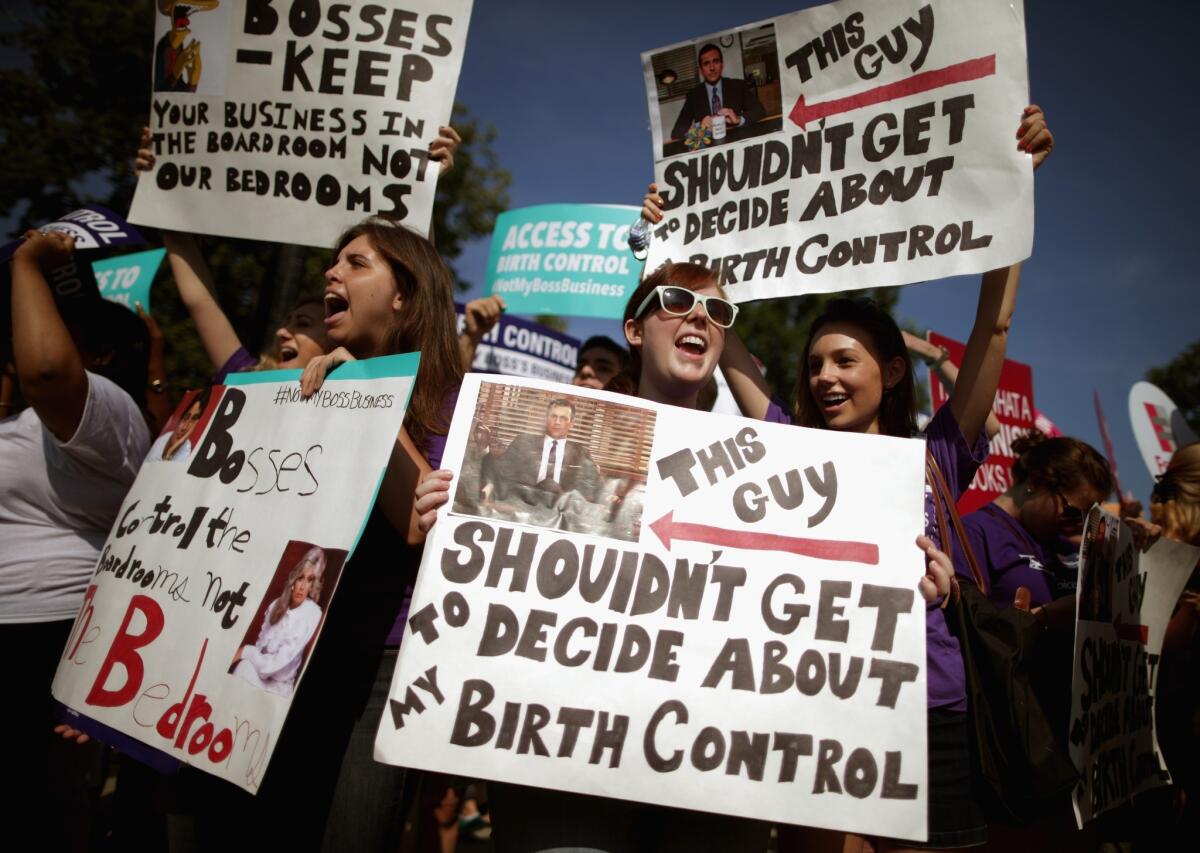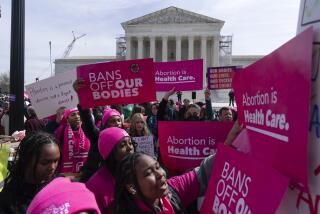Gay rights groups wary of Supreme Court’s Hobby Lobby ruling

Gay rights groups voiced cautious optimism Tuesday that this week’s Supreme Court decision exempting some corporations from offering contraceptive coverage for female workers will not trigger a widespread assault on same-sex benefits or anti-discrimination laws protecting gays and lesbians in the workplace.
But advocates emphasized that the full impact of the high court ruling, which Justice Ruth Bader Ginsburg criticized in her dissent as one of “startling breadth,” may not be known for years to come.
“The lesbian, gay, bisexual and transgender community watched this decision with bated breath,” said Sarah Warbelow, legal director of the Human Rights Campaign, a leading gay advocacy group in Washington, in a blog on its website. She said religious beliefs had long been used to deny gays “basic human rights.”
But she said the narrowly drawn opinion, written by Justice Samuel A. Alito Jr., went out of its way to draw a distinction between the healthcare coverage at issue and potential discrimination in hiring, where gays are particularly vulnerable. Alito said the decision did not “provide a shield for employers who might cloak illegal discrimination as a religious practice.”
In Monday’s 5-4 ruling, the conservative majority found in Burwell vs. Hobby Lobby Stores that the devout Christian owners of the arts and crafts chain had the right under the federal Religious Freedom Restoration Act of 1993 to refuse to offer the full contraceptive coverage mandated under President Obama’s Affordable Care Act.
Critics of the decision say they remain worried that other family-owned, religiously oriented corporations might make the same argument to justify discriminating on the basis of sexual orientation or gender identity.
Although Alito seemed to rule out using religious objections to justify racial discrimination in the workplace, Jennifer Pizer, senior counsel with the Lambda Legal advocacy group in Los Angeles, noted that he omitted any reference to discrimination based on gender or sexual orientation, potentially leaving the door slightly open to a conservative challenge.
“Could a religious employer claim a religious freedom to not hire transgender people?” Pizer asked. “I think we will see that argument. To say you have to accommodate a company’s religious beliefs in any context, that’s a recipe for an enormous amount of discrimination.”
Others were less worried. Gay rights advocates said they did not think the decision would enable a challenge to Obama’s promised executive orders barring discrimination against gays and transgender people by federal contractors.
And because the Hobby Lobby decision is based on federal law, it applies only to federal mandates, not state laws and local ordinances.
Sexual orientation is not included in the federal Civil Rights Act of 1964, which forbids employers and businesses from discriminating against people based on race, sex, color or national origin. Instead, most of the nation’s strongest gay rights measures have been passed at the state level.
Twenty states, including California and Illinois, have laws forbidding employers from discriminating based on sexual orientation, and those state laws will probably be unaffected by Monday’s ruling.
The Supreme Court in 1997 limited the reach of the federal religious freedom law and said it did not apply to state measures. So employers may not cite the Hobby Lobby ruling as giving them a religious exemption from state anti-bias laws.
At the same time, the court has given signs it is unwilling to grant businesses a constitutional right to discriminate against gays.
The clearest example came in April when the justices turned down an appeal from a New Mexico photographer who was charged with violating the state’s anti-discrimination law. Elaine Huguenin had refused to shoot a wedding album for a same-sex couple and cited her religious beliefs. In her appeal, she argued she had a free-speech right to choose her subjects for photos.
The case had drawn widespread attention because it clearly posed the question of whether the 1st Amendment could give people or businesses an exemption from serving gay customers. But without comment or dissent, the court denied the appeal.
More to Read
Start your day right
Sign up for Essential California for news, features and recommendations from the L.A. Times and beyond in your inbox six days a week.
You may occasionally receive promotional content from the Los Angeles Times.








